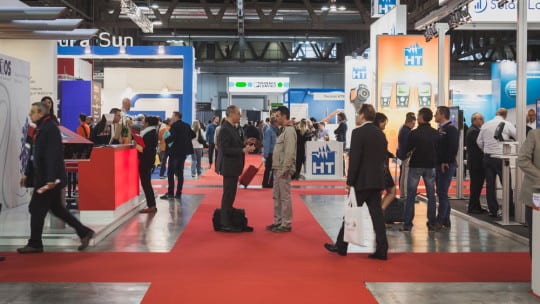
Recently, COVID-19 claimed another trade show–CES 2021, one of the world's largest. Instead of canceling outright, the show announced it will be all-digital. Of the more than 4,000 exhibitors who display next-generation thinking and innovative solutions, will any come close to making the same global splash as if 6,000 media and 170,000 attendees visited their booths in Las Vegas?
The shift from a large, in-person gathering to a completely online, digital experience requires problem-solving facilitators. Your early warning is here. All types of trade shows, events, and more will cancel or go all-digital for the foreseeable future. You have the advantage of planning. Here are ways to address this opportunity.
Double Down on Social
The usual buzz generated around a big event like CES comes not only from the show, but also from industry analysts, celebrity endorsements, and influencers.
Typically, influencer posts perform much better than those of brands. Perhaps it's time to alter your budget to enhance use of influencers.
Reality can be difficult. For brands that once opted for in-person, intimate experiences at trade shows, in an all-digital environment their earned media value could dip and become a fraction of what it once was. For that reason, it's likely the physical experience will return after the pandemic and remain a significant part of the travel and trade show industry. Until that time, success will be in how communicators merge the physical and digital worlds to create impactful, share-worthy moments.
So, it is important to consider how an event and your company's part in it will be packaged and distributed digitally. Your plan likely will call for new publics to target, as you need to provide media, influencers, and others with the right content to reach the target audience. Digital innovation and experiences are essential in this process as communicators rely on amplification to execute a successful plan.
Diversify Your Playbook
This is the first year communicators are seeing the ramifications of not paying millions to attend an event that aims to garner press and social coverage. Now, communicators must shift their expected evaluations based on theoretical conditions.
This should go without saying, but the communication plan you implement when the physical CES is gone must be timelier and more relevant. Turn a laser focus on what your audience needs most.
Rather than hosting an extensive webinar or Zoom meeting, consider moving parts of your event and communication to different channels. Hold a networking get-together by video or Twitter chat, post downloads of speaker segments on your website or on-demand. Organize content so people can grab specific segments or items throughout the day, as if they were choosing what information to focus on when standing, in-person, at your booth.
Taylor Swift offers excellent examples of diverse messaging and breaking norms. Swift told nobody–not even her record label–that she was releasing her Folklore album until hours before it was launched. Under the right conditions, surprise can be a great tactic for communicators. Surprise is one of the most potent forms of turning followers into active audiences.
Define Your Purpose
How did you evaluate trade shows pre-COVID-19? Were you measuring media impressions, attendance numbers, stock price changes, social media engagement? It is time to consider looking at relationship-building.
Communicators likely are wrestling with two possibilities: 1) Creating digital presentations catered to the industry–namely media or analysts who want an up-close, detailed look at a product or offering or 2) Offering consumer-focused content and prioritizing a strong online presence.
Today’s successful communicators are those willing to pivot quickly, embrace innovation and technology, and analyze situations and the media landscape to facilitate the best possible solution.
The pandemic has hit hard, but in some cases, it can prompt creativity. Communicators exist to maintain brand persona and deliver results no matter the situation. That makes communication departments more essential and relevant than prior to the pandemic.
David Wolpert is a PR pro in Dallas
